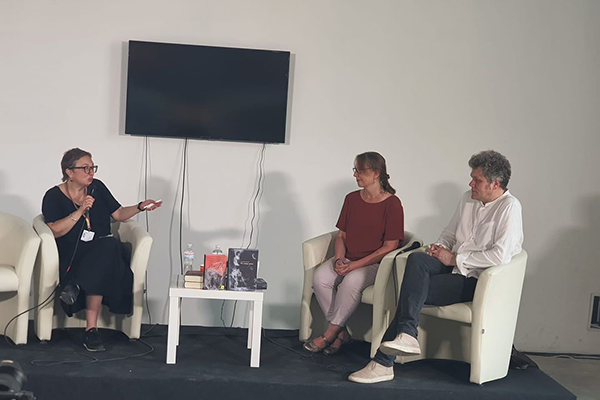
This event is part of a weekly series that the Center for Slavic, East European and Eurasian Studies (CSEEES) is organizing through April to help understand the war in Ukraine, and Ukrainian heritage, history, and culture. Please check our event page for a full listing of all events.
Ukraine is a multi-lingual, multi-ethnic, multi-confessional country, and its literature is richer for that fact. Numerous Ukrainian writers and scholars publish in Ukrainian; others have switched from their usual Russian to Ukrainian in the wake of the Russian encroachment that began in 2014. Some authors, however, continue to write, speak, and publish in Russian and to carry on the Russophone Ukrainian literary tradition that has brought us such world favorites as Nikolai Gogol and Mikhail Bulgakov. This conversation will explore Ukraine’s literary landscape, drawing from Professor O’Neil’s experience at the Kyiv Book Fair in 2021, her conversations with Russophone and Ukrainophone Ukrainian writers, and her translation journeys.
Presenter: Catherine O’Neil, U.S. Naval Academy
Catherine O’Neil is a literary scholar and professor of Russian language and culture at the United States Naval Academy. She received her PhD from the University of Chicago and her MA from the University of Toronto. She has written on Alexander Pushkin and Russian and European romanticism and has translated Polish poet Juliusz Słowacki in a bilingual edition of Agamemnon’s Tomb. She is currently translating two novels by Alexei Nikitin, Victory Park and The Face of Fire.
Suggested reading:
Alexei Nikitin, excerpt from The Face of Fire, translated by Catherine O’Neil and Dominique Hoffmann; Andrei Kurkov, A Humorous Ukrainian Writer, with Nothing to Laugh About
If you have any questions about accessibility or wish to request accommodations, please contact us at cseees@osu.edu. Typically, a two weeks' notice will allow us to provide access.
